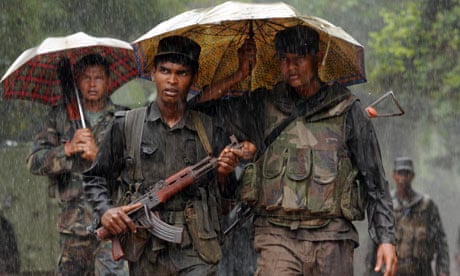Sri Lanka snubbed the international community's call for a ceasefire today, saying troops would not suspend their offensive against Tamil Tiger rebels despite reports of a growing civilian death toll.
The government said it would offer a limited amnesty to rebel forces that were ready to lay down their arms as they were on the brink of defeat in their 25-year-old struggle for a Tamil homeland. But ministers refused to hold peace talks, saying they would accept nothing less than total surrender.
Apparently down to their last 600 fighters, the Liberation Tigers of Tamil Eelam appear to be approaching the final battle with the Sri Lankan army. The military has encircled the rebels and says the Tigers are close to collapse, having lost almost 99% of the territory under their control only a year ago.
Earlier this week, the UN reported that at least 52 civilians were killed in a single shelling – though it did not blame any side for the attack – and said cluster bombs had been used. Doctors in the area estimate hundreds have died.
Pope Benedict XVI added his voice to the calls to stop the war for the sake of what he called "the growing number of innocent victims".
The quartet of Sri Lanka's international supporters – the US, the European Union, Japan and Norway – called for the rebels to stop fighting and take part in a political dialogue to end a civil war that has claimed more than 70,000 lives.
The call for talks received short thrift from the military. "Nothing could be as ridiculous as this," the defence secretary, Gotabhaya Rajapaksa, told the Island newspaper. "Nothing short of unconditional surrender of arms and cadres could bring an end to the offensive."
Rajapaksa, the younger brother of the president, Mahinda Rajapaksa, said any ceasefire was just a "transparent attempt to save the Tigers". Senior rebel figures, including their leader, Velupillai Prabhakaran, would be "tried and hanged", he said.
The defence ministry said a further 700 civilians had freely left rebel-held areas, although 120,000 were still being held by the rebels as "human shields".
The defence secretary stressed there would be no future political role for the Tigers, who experts claim will return to jungle-based guerrilla warfare if they are defeated in this conventional war.
"The international community should not expect the Sri Lankan government to allow the LTTE's participation as a political party in a fresh negotiations process after the armed forces crushed its wherewithal to wage war," he said.
Sri Lanka's prime minister, Ratnasiri Wickremanayake, described the fighting as a "humanitarian operation" designed to end terrorism and liberate Tamils from the "oppression" of the rebels.
"The government is not prepared to stop this humanitarian operation. No force can stop this operation. Government forces have already achieved significant victories against the terrorists," he said.
Analysts say the government's plan was to finish off the Tigers militarily and politically, leaving Sri Lanka's Tamil minority in a political vacuum.
"The defence secretary has made it clear he is not going to enter into negotiations which privilege the LTTE," said Paikiasothy Saravanamuttu, the director of Colombo's Centre for Policy Alternatives. "But the international community has always made it clear that they represent a section of the Tamil polity. That's a problem."
